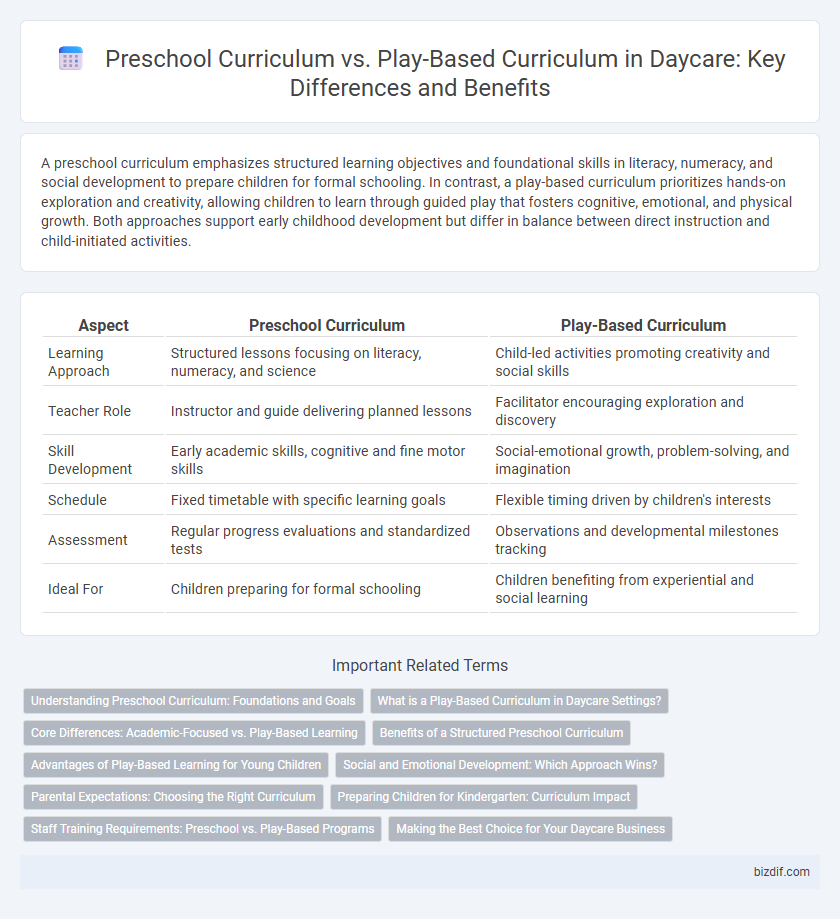A preschool curriculum emphasizes structured learning objectives and foundational skills in literacy, numeracy, and social development to prepare children for formal schooling. In contrast, a play-based curriculum prioritizes hands-on exploration and creativity, allowing children to learn through guided play that fosters cognitive, emotional, and physical growth. Both approaches support early childhood development but differ in balance between direct instruction and child-initiated activities.
Table of Comparison
| Aspect | Preschool Curriculum | Play-Based Curriculum |
|---|---|---|
| Learning Approach | Structured lessons focusing on literacy, numeracy, and science | Child-led activities promoting creativity and social skills |
| Teacher Role | Instructor and guide delivering planned lessons | Facilitator encouraging exploration and discovery |
| Skill Development | Early academic skills, cognitive and fine motor skills | Social-emotional growth, problem-solving, and imagination |
| Schedule | Fixed timetable with specific learning goals | Flexible timing driven by children's interests |
| Assessment | Regular progress evaluations and standardized tests | Observations and developmental milestones tracking |
| Ideal For | Children preparing for formal schooling | Children benefiting from experiential and social learning |
Understanding Preschool Curriculum: Foundations and Goals
Preschool curriculum focuses on structured learning objectives designed to build foundational skills in literacy, numeracy, and social development. Play-based curriculum emphasizes child-led exploration and hands-on activities that foster creativity, problem-solving, and emotional growth. Understanding these curricula involves recognizing how each approach supports early childhood development through different methods and targeted outcomes.
What is a Play-Based Curriculum in Daycare Settings?
A play-based curriculum in daycare settings emphasizes learning through child-initiated activities that foster creativity, social skills, and cognitive development. Unlike traditional preschool curricula that follow structured lessons and predetermined outcomes, play-based programs prioritize exploration, imagination, and hands-on experiences. Research shows that this approach supports emotional regulation and problem-solving abilities in early childhood.
Core Differences: Academic-Focused vs. Play-Based Learning
Preschool curriculum emphasizes structured academic skills such as literacy, numeracy, and phonics, preparing children for formal schooling through teacher-led activities and measurable learning outcomes. Play-based curriculum prioritizes child-led exploration, creativity, and social development, using imaginative play and hands-on experiences to foster cognitive and emotional growth. Core differences hinge on academic-focused skill acquisition versus holistic, experiential learning that nurtures problem-solving and interpersonal skills.
Benefits of a Structured Preschool Curriculum
A structured preschool curriculum provides clear learning objectives that promote cognitive, social, and emotional development through age-appropriate activities. Research shows that children in structured programs demonstrate improved language acquisition, early literacy, and numeracy skills compared to those in exclusively play-based settings. Consistent routines and targeted instruction within a structured curriculum help prepare children for academic success and foster self-discipline.
Advantages of Play-Based Learning for Young Children
Play-based learning enhances preschoolers' cognitive, social, and emotional development by encouraging creativity, problem-solving, and collaboration through hands-on activities. This curriculum fosters intrinsic motivation and engagement, making learning more meaningful and enjoyable for young children. Research shows that play-based programs improve language skills, executive function, and adaptability, supporting holistic growth in early childhood education.
Social and Emotional Development: Which Approach Wins?
Preschool curriculum emphasizes structured learning activities that target social skills such as cooperation and emotional regulation, fostering early self-discipline. Play-based curriculum nurtures social and emotional development through imaginative play, peer interactions, and problem-solving scenarios, promoting empathy and resilience. Studies indicate play-based approaches more effectively support deep social-emotional growth by integrating natural learning contexts with child-led exploration.
Parental Expectations: Choosing the Right Curriculum
Parental expectations often influence the choice between a preschool curriculum, which emphasizes structured learning objectives and early academic skills, and a play-based curriculum that fosters creativity, social development, and emotional growth through exploratory activities. Research shows that parents seeking measurable progress in literacy and numeracy may prefer preschool curricula designed around standardized benchmarks, while those valuing holistic development tend to favor play-based programs that support cognitive and motor skills through child-led play. Understanding these priorities helps caregivers select the optimal curriculum aligned with their child's developmental needs and family values.
Preparing Children for Kindergarten: Curriculum Impact
Preschool curriculum emphasizes structured learning objectives aligned with kindergarten readiness standards, focusing on literacy, numeracy, and social skills development. Play-based curriculum fosters cognitive, emotional, and physical growth through guided exploration and social interaction, nurturing creativity and problem-solving abilities. Research indicates a balanced integration of both approaches enhances school readiness by combining skill acquisition with critical thinking and adaptability.
Staff Training Requirements: Preschool vs. Play-Based Programs
Preschool curriculum staff training emphasizes structured lesson planning, early literacy, numeracy, and developmental milestones to ensure children meet academic benchmarks. Play-based program staff require specialized training in child-led learning techniques, social-emotional development, and observation skills to facilitate exploration and creativity. Both approaches demand continuous professional development but differ significantly in focus, with preschool staff prioritizing curriculum delivery and play-based educators focusing on guided discovery.
Making the Best Choice for Your Daycare Business
Choosing between a preschool curriculum and a play-based curriculum directly impacts your daycare's educational outcomes and parent satisfaction. A structured preschool curriculum emphasizes early literacy, numeracy, and science skills, promoting cognitive development and school readiness. In contrast, a play-based curriculum fosters creativity, social-emotional growth, and problem-solving through child-led activities, ideal for holistic development and long-term engagement.
Preschool curriculum vs play-based curriculum Infographic

 bizdif.com
bizdif.com